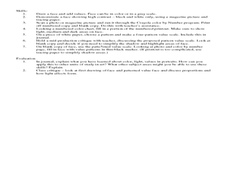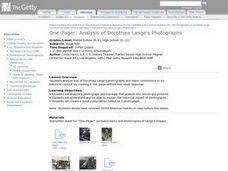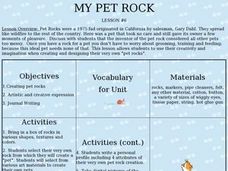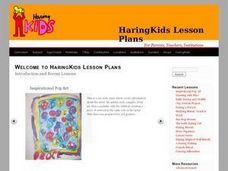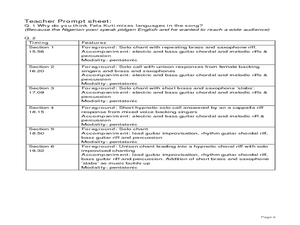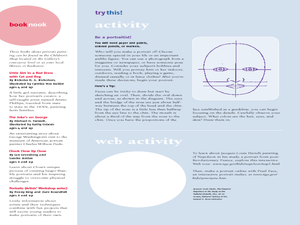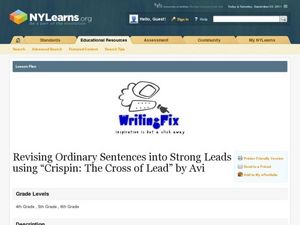Curated OER
Mystery Box
Students use their sense of touch to describe an object in the mystery box. In this mystery box lesson, students use linguistic abilities to describe the object. Students give as much detail as they can as to what they feel that object...
Curated OER
Morley [LAM 4]
Students use a bar and beat numbers to identify various terms of vocal music in this organized worksheet. Then they explain the use of texture within the extract. Students also locate an example of suspension and analyze their treatment....
Curated OER
Where are your borders?
Students explore the meaning of borders, both real and symbolic. After viewing film footage and visiting poetry websites, they develop their own point of view. To express their perspective, they are to write a journalism poem, or...
Curated OER
Tissue Paper Designs
Fifth graders explore the colors in the color wheel and complete a tissue art activity that includes a minimum of three different colors from the color wheel and two colors that are opposite each other on the color wheel. They discuss...
Curated OER
Pattern Value Portraits with Light
Students use the elements of art and principles of design to explore value. In this color value lesson, students use the portrait of a a face to help them understand color value, tints, shades and tones.
Curated OER
Going West: The Artist Who Painted the Way
Fifth graders study the artists and artwork of the Westward movement. In this Westward Movement instructional activity set, 5th graders examine the characteristics of the art of this era. They look at the lives of the artists and think...
Curated OER
Designing a Bus Stop
Students evaluate visual arts by creating a design for a small building. In this art analysis instructional activity, students identify the work of Keith Haring and discuss his uses of color and expression. Students collaborate...
Curated OER
Music and Interdisciplinary Connections
Young scholars examine the interconnectedness of different art forms. They listen to music and watch a video while determining the similarities of the themes. They make connections between books, movies, opera, dance, and music.
Curated OER
Mass and Space
Students view a variety of sculptures analyzing how space and mass interact, and how sculptors make choices about mass and space to express meaning in their art. They make small three-dimensional sketches experimenting with mass and space.
Curated OER
Designing a CD Cover
Tenth graders design a CD cover and compare and contrast traditional and drawing methods with the use of AppleWorks and Photoshop software. They create a professional design layout using AppleWorks, and present their design in the form...
Curated OER
Personal Peace Symbols
Eleventh graders produce a work of art that symbolizes peace and their experiences with it. In this peace symbolism lesson, 11th graders sketch symbols associated with peace view art examples of peace images. Students complete a...
Curated OER
Analysis of Dorothea Lange's Photographs
Students analyze a photo of Dorothea Lange and make connections to its historical context by creating a written and visual response. For this photograph analysis lesson, students analyze Lange's photograph and explain the historical...
Curated OER
My Pet Rock
Learners learn about and create a pet rock. In this creative expression activity, students pick a rock to make into their "pet". Learners use various art materials to create their pets and write a personal profile which...
Curated OER
Why Not Fabric?
Students investigate art from Native American culture by creating fabric. In this native art analysis lesson, students identify the art of Plains Indians and discuss how it is represented in their fabrics, beads and decorations. Students...
Curated OER
Showing Depth
Fourth graders examine and demonstrate how to create a middle ground, background, and foreground on a picture or work of art. They identify middle ground, background, and foreground on Michael Sowa's works of art, then create their own...
Curated OER
Pattern and Shading
Students dentify patterns in their everyday environment. They create several types of pattern, including hatching, crosshatching, and stippling and discover that hatching lines may be drawn horizontally, vertically, or diagonally.
Curated OER
Haydn 's Surprise
Students explore the background of Haydn's Surprise and the texture of the music. The teacher uses mouse and lion puppets to demonstrate soft and loud music. They tiptoe and stomp to display the concept. and play a soft/loud singing game.
Curated OER
Songs of Fela Kuti – Nigeria
Students explore the music of Fela Kuti. In this music lesson, students listen to the fusion protest music of Fela Kuti of Nigeria. Students reflect on Kuti's music and message.
Curated OER
Portraits
Students study examples of portrait art. In this portrait lesson, students read about the technique of portrait art and study examples of the portraits. Students then practice portrait art.
Curated OER
Discovering Adjectives
Young scholars work in groups to discover and practice using adjectives. They use food items for the activity and compete with other groups on who can have the most adjectives. They may use other materials in the room as well.
Curated OER
Elements of Design
Students define basic design vocabulary. They examine fabrics and sort into similar piles, design a picture of a beautiful room and label each art element in the design. They read an article from an interior design magazine and summarize...
Curated OER
Sensory Descriptors
Students feel items in a bucket and describe them using descriptive words. In this sensory descriptive lesson plan, students use words such as smoothe, rough, and bumpy.
Curated OER
Johnny Appleseed Reading and Writing
First graders explore language arts by reading a classic story in class. In this word choice lesson, 1st graders read the story of Johnny Appleseed and identify the descriptive words and sentences the author used to entice the reader....
Curated OER
Revising Ordinary Sentences into Strong Leads Using "Crispin: The Cross of Lead"
Students create stories using powerful introductory sentences by creating something other than "Once upon a time...". In this sentences lesson plan, students read The Cross of Lead to base their introductory sentences on.
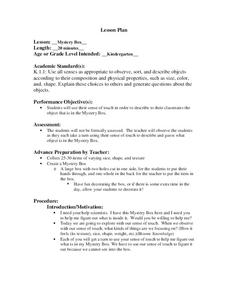
![Morley [LAM 4] Worksheet Morley [LAM 4] Worksheet](http://content.lessonplanet.com/resources/thumbnails/166274/large/cgrmlwnvbnzlcnqymdezmdmzmc0yodixmi03d2vsdziuanbn.jpg?1414266623)


